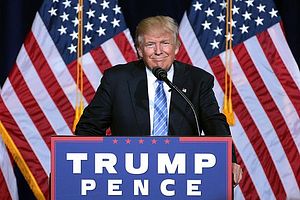What are the implications of a Trump presidency for U.S.-China relations?
This has been the most frequently asked question among Chinese policymakers, analysts, and media pundits, both before and after the November election. But the answer, to quote Bob Dylan, is “blowing in the wind.”
There are simply too many unknowns about the president-elect to make any sensible predictions about his China policy. Unlike Hilary Clinton, he has never served in any government office. He did bash China repeatedly during the three presidential debates, but he mentioned China mostly in passing, without elaborating how he intends to deal with Beijing in the next four years. He has announced several picks for cabinet positions, but there are few hints as to who will head the Departments of State, Defense, and the Treasury — the three most important departments in managing bilateral relations. The only certainty with Trump’s China policy, as many observers of U.S.-China relations put it, is uncertainty.
Nevertheless, a number of Chinese analysts appear to believe that the bilateral relationship will be better off under Trump. Their optimism is based primarily on two premises. First, he is expected to bring pragmatism and flexibility — two crucial qualities in the business world — into his foreign policymaking. Consequently, ideology — concerning issues such as human rights, democracy, or anti-Communism — is expected to have little impact on his foreign policy thinking.
Second, the conventional wisdom of the Chinese foreign policy establishment is that a Republican president is easier to deal with than a Democratic one. During his historic meeting with Richard Nixon in 1972, Chairman Mao Zedong reportedly said that he preferred those on the right (Republicans) to those on the left (Democrats) because the former are straightforward and practical while the latter are hypocritical and ideological. Mao proved to be prescient: Republican presidents have played a pivotal role in the not-so-long history of U.S.-China relations. Nixon laid the foundation for normalization; George H. W. Bush single-handedly salvaged the fledgling relationship in the aftermath of what happened in the summer of 1989; and George W. Bush left office with the relationship arguably at its best since 1972.
To be sure, professional background — plus experiences in formative years — could decisively shape a politician’s policy preferences. But if you are the occupant of the Oval Office, you are surrounded by such a dense web of expectations, norms, institutions, and bureaucracies, that your personal preferences usually give way to the preferences of your advisers, cabinet members, powerful members of Congress, or high-profile interest groups. It is one thing that Trump used to be a successful businessman, and it is quite another to assume that he will be an ardent supporter of U.S.-China economic ties.
Meanwhile, though the president-elect is a Republican, he is an unconventional one by any standard. In fact, he ran for the Republican nomination by running against the Republican Party. He turned the GOP on its head by opposing free trade and advocating an isolationist foreign policy. His relationship with the party establishment is so bad that many prominent Republicans signed open letters denouncing his presidential candidacy. Thus it would be a stretch to put Trump in the same category as Nixon and the two Bush presidents.
On the contrary, there are worrying signs that U.S.-China relations may well embark on a downward trajectory under the Trump presidency. For starters, the former real estate mogul’s personality could spell troubles for Beijing. He appears to be a man with a super-ego, who craves attention and publicity. He seems to have lived a life that knows nothing but success. He also has a reputation for being vengeful. As the author of the best-selling The Art of the Deal, he is known to be a tough negotiator. All these qualities could put him on a collision course with Chinese leaders.
More importantly, Trump’s promise to make America great again could conflict with the great rejuvenation of the Chinese nation. The former taps into widespread perceptions among Americans of their country’s declining global leadership, while the latter suggests Chinese leaders’ confidence about China’s growing global leadership. In this sense one can draw an analogy between Ronald Reagan and Donald Trump. The former ran for the presidency in 1980 against the background of economic woes at home and Soviet expansion abroad. He reversed America’s global retrenchment in the aftermath of the Vietnam War — as embodied in the Nixon doctrine — by launching an arms race with Moscow. Similarly, the Obama presidency can be viewed as a period of global retrenchment in the wake of the wars in Afghanistan and Iraq. Now that China also seems to be on a path of global expansion, Trump may feel compelled to follow in the steps of Reagan.
Of course, there are many differences between China today and the USSR then. Beijing and Washington are not mired in a cold war. Besides, while there was no trade at all between Washington and Moscow during the Cold War; today China and the United States are entangled in massive flows of goods, people, and services. Nevertheless, compared with the USSR, China may seem even more threatening in the eyes of some Americans because of the apparently widespread appeal of the China Model.
Also America today is different from America in the 1980s, especially in terms of its financial solvency. But economic constraints can hardly prevent a determined leader from adopting costly and risky policies. When worries about the China threat become paranoid, as reflected in the popularity of such books as The Hundred-Year Marathon, Washington may well overreact strategically.
So it seems too early to celebrate an upcoming golden era of U.S.-China relations. The higher the expectations, the deeper the disappointment if these expectations fail to materialize.

































